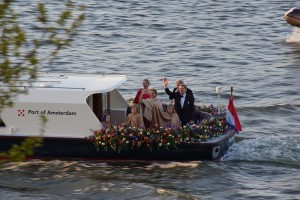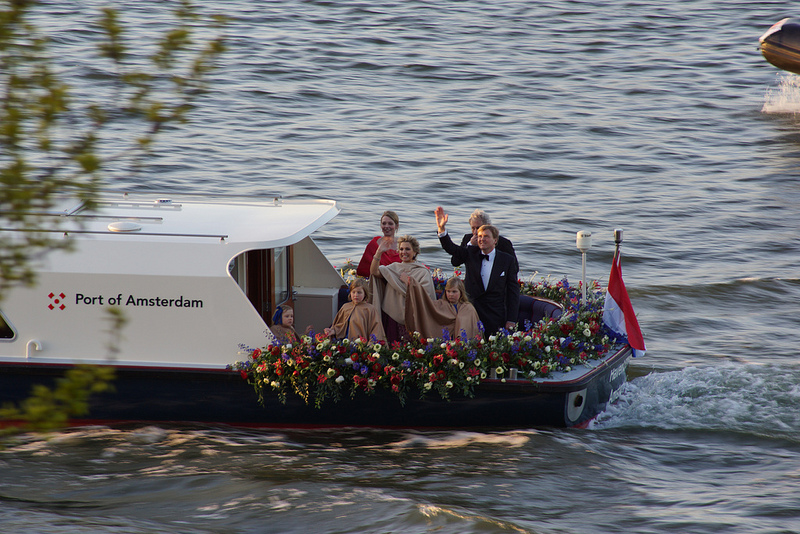Coronation Conundrums

It was my Dutch friend that brought it up.
We were standing in the living room, the day of the coronation. Outside a crowd was slowly building, awaiting the arrival of the new King and his family who were due to sail past in a royal flotilla, as part of the celebrations.
All of a sudden she took stock of the room and realised that she was surrounded by a motley crew of nationalities. German, Scottish, English, Danish, Italian.
What the heck were we all doing there she wondered. And to cheer at a Dutch King too of all things!
She had in fact asked the same question of herself earlier in the evening.
“You know, I’m a republican at heart, so all of this should really piss me off. And yet, here I am, hanging out the window enjoying myself.”
I just nodded. The Dutch royal family seem to have this effect upon people it seems.
Ever since my arrival in The Netherlands, I have often pondered my relationship with Queen’s Day, an exuberant Dutch holiday which ostensibly celebrates the monarch’s birthday, but which, in reality, has always been more of a street party come garage sale.
It’s the only day of the year that the Dutch are allowed to sell anything they want on the streets without a licence.
Whoever thought this up is a genius and has probably helped steer the Dutch monarchy through some choppy waters over the years. Commercial savvy is deeply ingrained in the Dutch spirit and celebrating an event, even a Royal one, by throwing a giant national car boot sale, is definitely not a thing any self-respecting Dutchman would frown upon.
It is also this “volks” aspect of Queen’s Day that has always thrown me. Something about the anarchic free for all means I find myself actually enjoying the whole spectacle – royalist fiesta or not.
This may be a celebration for the Queen’s birthday, but the party definitely belongs to the people.
Back home, I could never imagine heading to London to cheer on the Queen during Trooping Of The Colour.
The very idea of it seems abhorrent.
I think it may be the sheer formality that surrounds the British realm. All that pomp and circumstance, sets the royals as a breed apart and serves merely to underscore the difference between us ordinary folk and those anointed “Royal” ones.
It’s an idea that simply jars. And the pomp and ceremony has the effect of compounding the strangeness of it all.
When I lived in the UK I used to assume that my lack of royal sympathies lay in the fact that I am Scottish.
Growing up in Glasgow, the House of Windsor were largely conspicuous by their absence in the local psyche. There was a Queen, sure. But she always seemed something of an English phenomenon. An aspect of her that I took for granted and understood without really ever being able to pinpoint why.
In Scotland it always felt as though we simply had other things to think about and enjoy.
When the Queen came to Glasgow as part of the silver jubilee celebrations, I remember my dad being excited about it. Not because he went down to the walkabout and saw the Queen, but because the TV cameras where there and he was hoping to turn on the evening news and catch sight of himself on the box.
And it was this that rallied us round the TV that evening. Dad was going to be on the TV! Wow!
Reverence for royalty was not something that came naturally to anyone in my family.
You had to earn your authority seemed to be the order of the day. Earn it through doing something exceptional. It didn’t really matter what that exceptional thing was, as long as you did it and made an effort and enjoyed it.
With this in mind, it was very easy to look at the royals and wonder just what it was they did that commanded such respect.
The answer, in the end, seemed to be, not a lot.
And so we simply ignored them. They were the background noise in a national tableaux that contained other figures far more interesting and exciting.
Coming to Holland then, was something of a shock.
There seemed to be genuine affection for the “Oranjes” here. And I must admit I found myself watching this “bicycling monarchy” with a strange mixture of curiosity, confusion and not a little awe.
Sure, they walked and talked and dressed “other” and there was no doubt they were considered “regal”.
Yet, at the same time, they seemed less formal, less aloof, more approachable somehow and I have often wondered just how it is they accomplish this magical feat.
Dutch friends of mine are always astounded when I mention that the former Queen Beatrix seemed warm and matronly.
They of course compare her to her mother, Juliana, who they remember fondly in this fashion. The mother figure. Beatrix was always seen as an intelligent, business like figure.
But I am comparing her to Elizabeth of course, and the comparison has always come out in Beatrix’s favour.
I can imagine giving the Beatrix a hug. Elizabeth would demand a curtsey.
It’s a big difference.
The day of the coronation only served to further highlight the differences between the two royal houses.
To see Beatrix abdicate. To watch her on the palace balcony as she stepped aside (quite literally) and allowed her son to take centre stage, was an extremely foreign experience for me. Despite my upbringing and my years abroad, my British character is still programmed to view monarchy in a certain way. And abdication is simply not how it’s done.
The fact that the crown was never placed on the new King’s head struck me as telling in some way. As if all that regalia was something that he too could only behold and could not touch, just like the rest of us (even if that regalia turns out to be polished glass rather than gemstones).
Seeing al this though, made me warm even more to the Dutch royal family. Almost in spite of myself.
I found myself hoping that Beatrix can enjoy a well-earned rest and looking on at Willem-Alexander and wishing him all the best.
Of course it’s far easier as a foreigner to enjoy all of this, because you don’t have as much of a stake in it all.
I am not familiar with any of the past mistakes or scandals that must have certainly befallen the House of Orange in the past and the current scandals are not something I have paid much attention to.
They’re not “my” royal family after all.
Whereas with every political pronouncement that Prince Charles makes (even when I agree with him) I find myself giving him a mental ticking off and telling him to but out.
When King Willem-Alexander next attends a water conference though, I’ll probably read what he has to say on the matter.
And it is this ambivalence that ensured that my living room was filled that coronation evening with a flag waving, happy, cheering troupe of friends.
None of us were especially royalist and the Dutch contingent were even avowed republicans, but for all that, we opened the windows and waved enthusiastically as the King sailed past.
And when it was over we closed the windows and continued with “our” party.
Because that’s how it goes here, and I, for one, ain’t complaining.

